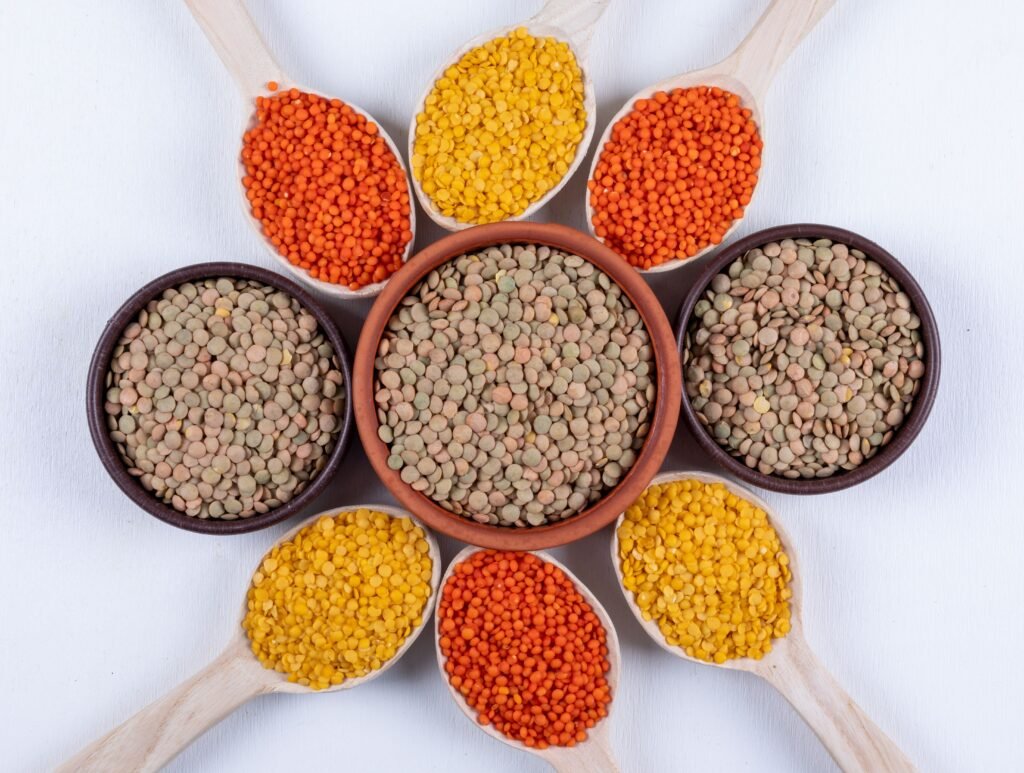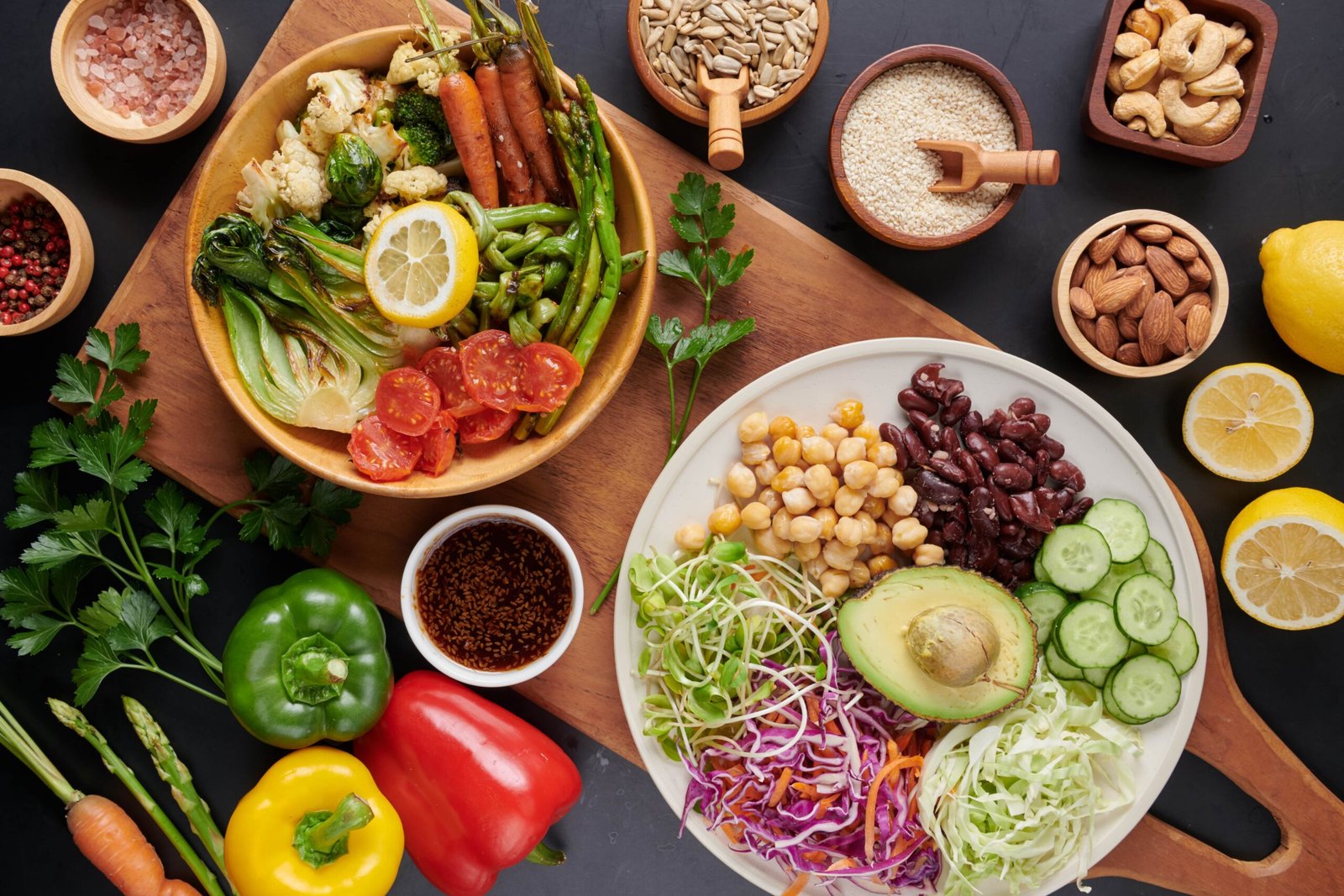If you’ve ever stood in front of a wall of probiotic supplements, kombucha bottles, and exotic powders wondering, “Do I really need all of this for my gut health?” — you’re not alone. I was in that exact position a few years ago. I wanted better digestion, less bloating, and more energy, but the endless supplements and “superfoods” felt overwhelming (and expensive).
The good news? You don’t need to spend hundreds of dollars or chase down hard-to-pronounce powders from the far corners of the internet. Your gut loves the simple, everyday foods you probably already have in your kitchen. In fact, some of the best beginner-friendly gut health foods are inexpensive, gentle on the stomach, and backed by science.
This blog is about those foods — the ones that work with your body rather than against it. I’ll walk you through my top 5 beginner-friendly gut foods (no fancy supplements required), explain the scientific reasons behind their benefits, and share a few personal tips from my own gut health journey.
Table of Contents
Why Gut Health Matters
Before we dive into specific foods, let’s take a step back and understand why gut health gets so much attention. You’ve probably heard phrases like “the gut is the second brain” or “health begins in the gut,” but what does that actually mean?
The Gut Microbiome: Your Inner Ecosystem

Inside your digestive tract live trillions of microorganisms — mostly bacteria, but also fungi and viruses. Collectively, these form the gut microbiome. Instead of thinking of bacteria as “bad,” imagine your gut as a bustling community. Some bacteria are harmful, but many are beneficial and play critical roles in keeping you healthy.
These microbes help with:
- Breaking down food that your body can’t digest on its own.
- Producing short-chain fatty acids (SCFAs), which reduce inflammation and nourish your colon.
- Balancing your immune system — about 70% of immune cells live in your gut.
- Influencing your brain through the gut-brain axis, which affects mood, stress, and even sleep.
When your gut microbiome is balanced, you’re more likely to feel energetic, digest food comfortably, and have fewer health issues. When it’s out of balance (dysbiosis), symptoms like bloating, constipation, skin problems, and low mood can creep in.
Everyday Signs Your Gut Needs Support
You don’t have to wait for a diagnosis to start caring about your gut. Some everyday red flags that your microbiome might need a boost include:
- Frequent bloating or gas after meals.
- Constipation or irregular bowel movements.
- Feeling tired even after enough sleep.
- Mood swings, anxiety, or brain fog.
- Skin flare-ups (acne, eczema).
I personally noticed that when my gut was struggling, I felt foggy in the afternoons and had this heavy, sluggish feeling after even small meals. Once I started eating more gut-friendly foods, not only did my digestion improve, but I felt a clear lift in energy and focus.
Why Food Matters More Than Supplements (Especially for Beginners)
Supplements can be helpful for certain cases, but food is often the most sustainable way to build gut health — especially if you’re just starting out. Here’s why:
- Whole foods provide prebiotics + probiotics together.
For example, yogurt gives you probiotics, and oats give you prebiotics (fiber that feeds good bacteria). Supplements usually only cover one piece of the puzzle. - Better absorption and diversity.
Your body absorbs nutrients from real food in a way that’s often more complete than from a pill. Plus, no single supplement can mimic the rich variety of compounds found in whole foods. - Gentler on digestion.
Supplements can sometimes cause bloating, cramping, or diarrhea. Whole foods, when introduced gradually, are easier to tolerate. - Cost-effective.
A tub of plain yogurt or a bag of oats costs less than a month of probiotic pills.
Science-Backed Benefits of Supporting Your Gut
If you’re someone who loves evidence, here’s the exciting part: countless studies show how diet shapes gut health. To name just a few:
- A 2016 review in Nutrition Reviews found that dietary fiber increases beneficial bacteria like Bifidobacterium and Lactobacillus.
- Research published in Nature (2018) confirmed that fermented foods introduce live microbes that can shift the microbiome balance.
- A 2020 study linked a diverse diet rich in plants with lower inflammation and better metabolic health.
These aren’t fringe findings — mainstream science continues to support what traditional wisdom has said for centuries: good food is good medicine, especially for the gut.
The Top 5 Beginner-Friendly Gut health Foods
When you’re starting your gut health journey, simplicity is key. These five foods are gentle, affordable, and proven by science to support your microbiome. Best of all, they don’t require complicated recipes or exotic shopping trips. Let’s explore them one by one.
1. Plain Live-Culture Yogurt (or Dairy-Free Kefir)

We’ve already touched on yogurt as a gut hero, but it deserves a deeper dive.
Why it works:
- Provides probiotics like Lactobacillus and Bifidobacterium.
- Helps digestion and may reduce lactose discomfort.
- Supports immune function.
How to eat it:
- With bananas and cinnamon for a gut-friendly breakfast.
- Blended into smoothies with oats for extra prebiotic fiber.
- Savory option: mixed with cucumbers and herbs as a dip.
Personal note: My gut felt calmer within two weeks of switching from sugary yogurts to plain Greek yogurt.
2. Cooked Oats (Oatmeal)
If yogurt feeds your gut with probiotics, oats provide the prebiotic fiber those bacteria need to thrive.
Science behind oats:
- Rich in beta-glucan, a soluble fiber that encourages beneficial bacteria.
- Fermentation of oats in the colon produces short-chain fatty acids (SCFAs), which reduce inflammation.
- Gentle on digestion compared to some raw fibers.
How to eat them:
- Overnight oats: soak oats in milk or yogurt, add banana slices.
- Warm oatmeal: top with cinnamon and blueberries.
- Blend cooked oats into smoothies for creaminess and extra fiber.
Personal note: I used to skip breakfast, but when I started eating oats daily, I felt more grounded and steady through the morning. They also noticeably reduced mid-day sugar cravings.
3. Bananas (Especially Slightly Unripe)

Bananas are one of the most underrated gut foods. Sweet, portable, and cheap — they also pack a gut-boosting secret.
Why bananas matter:
- Resistant starch (especially in slightly green bananas) acts like prebiotic fiber.
- Feeds beneficial bacteria like Bifidobacteria.
- Gentle enough for sensitive stomachs.
How to eat them:
- Slice into yogurt or oats.
- Blend into smoothies with spinach and almond milk.
- Freeze chunks for banana “ice cream.”
Personal note: A banana before my morning walk became my go-to. It felt light yet filling, and over time I noticed fewer “gurgly stomach” mornings.
4. Sauerkraut (or Other Naturally Fermented Vegetables)
If you want probiotics but aren’t into supplements, sauerkraut is a powerful, natural option.
Science of sauerkraut:
- Made by fermenting cabbage with lactic acid bacteria.
- Rich in live microbes that may diversify the gut microbiome.
- Contains antioxidants and vitamin C in addition to probiotics.
Tips for beginners:
- Start small: 1–2 teaspoons a day, since too much too fast can cause gas.
- Look for raw, unpasteurized sauerkraut in the refrigerated section (shelf-stable versions are usually pasteurized).
- Other options: kimchi, fermented pickles, or miso.
How to eat it:
- Mix into salads or grain bowls.
- Add as a side to sandwiches.
- Stir a spoonful into soups after cooking.
Personal note: The first time I tasted sauerkraut, I was skeptical of the sour flavor. But now, I crave that tangy crunch — and my digestion feels smoother when I include it regularly.
5. Cooked Lentils (or Other Gentle Legumes)

Finally, let’s talk about legumes — one of the most affordable and filling gut-friendly foods.
Why lentils shine:
- Packed with soluble fiber and resistant starch that act as prebiotics.
- Support steady blood sugar (important for overall health).
- Provide plant-based protein along with gut-friendly fiber.
Tips for tolerance:
- Soak lentils overnight to reduce compounds that cause gas.
- Start with small servings (½ cup cooked) to let your gut adapt.
- Cook thoroughly — softer lentils are easier to digest.
How to eat them:
- Lentil soup with carrots and celery.
- Lentil salad with olive oil and lemon.
- Add to curries or stews for a fiber-protein boost.
Personal note: I used to avoid beans because of bloating. But once I learned to soak and cook lentils properly, they became one of my favorite comfort foods — filling, hearty, and gut-friendly.
Why These 5 Foods Work Together
Each of these five foods plays a different role in gut health:
- Yogurt/sauerkraut bring probiotics (live microbes).
- Oats/bananas/lentils bring prebiotics (fiber to feed the microbes).
Together, they create a balanced gut starter pack that promotes diversity, stability, and resilience in your microbiome. And best of all, they’re inexpensive, widely available, and easy to prepare.
How to Incorporate These Foods Week by Week
Starting everything at once can overwhelm your system (and your grocery list). The best approach is to add these foods gradually, so your gut has time to adjust. Here’s a gentle 4-week beginner plan:
- Week 1: Yogurt
Add ½ cup of plain live-culture yogurt (or kefir) daily. Try it with banana slices or a drizzle of honey. - Week 2: Oats
Introduce oatmeal or overnight oats 2–3 times per week. Combine with yogurt and fruit for a probiotic + prebiotic combo. - Week 3: Bananas
Add one banana per day, ideally slightly green for resistant starch. Perfect as a mid-morning or pre-workout snack. - Week 4: Sauerkraut + Lentils
Start small with sauerkraut (1–2 teaspoons a day) and add ½ cup cooked lentils into a meal. Slowly increase portions as your gut adapts.
By the end of the month, you’ll be regularly eating all five foods without feeling overwhelmed.
Benefits Beyond Digestion
When we talk about gut health, most people think only of smoother digestion — less bloating, easier bathroom trips, or fewer stomach cramps. But the gut does much more. It’s often called the body’s “second brain” because it influences energy, immunity, mood, skin, and even sleep. Here’s how nourishing your gut ripples across your whole body.
Steady Energy
A healthy gut helps break down food more efficiently, unlocking nutrients like B vitamins that fuel your cells. Good microbes also ferment fiber into short-chain fatty acids (SCFAs), which help regulate blood sugar. That means fewer spikes and crashes, and more consistent energy. When I swapped my sugary breakfast for oats and yogurt, my afternoon crashes almost disappeared.
Stronger Immunity
Did you know around 70% of your immune system lives in your gut? A diverse microbiome teaches immune cells to respond properly — fighting real threats while avoiding unnecessary inflammation. Since adding more probiotic and fiber-rich foods, I’ve noticed I catch fewer colds and recover faster when I do get sick.
Better Mood
The gut produces most of the body’s serotonin, the “happy hormone.” This means your microbiome has a direct line to your brain through the gut–brain axis. Research shows probiotics can ease anxiety and stress, while prebiotics help regulate cortisol. For me, eating more gut-friendly foods brought a surprising bonus: calmer moods and sharper focus.
Clearer Skin
The gut–skin connection is real. When the microbiome is off balance, inflammation can flare up as acne, eczema, or redness. When it’s balanced, your skin often clears naturally. I used to spend on creams that barely worked, but once I consistently ate more fiber and fermented foods, my skin slowly calmed without fancy products.
Deeper Sleep
Your gut also influences sleep. Microbes help regulate melatonin, the hormone that governs your sleep–wake cycle, and they produce compounds that signal relaxation. People with a healthier gut tend to sleep more soundly. After improving my diet with oats and yogurt, my restless nights eased, and I woke up feeling more refreshed.
Conclusion
Supporting your gut health doesn’t have to be complicated, expensive, or filled with trendy supplements. The truth is, some of the most powerful tools for a healthier microbiome are simple, affordable foods you can find at any grocery store — yogurt, oats, bananas, sauerkraut, and lentils. Together, they provide the probiotics and prebiotics your gut needs to thrive.
The benefits go far beyond smoother digestion. With a balanced gut, you unlock steadier energy, stronger immunity, calmer moods, clearer skin, and deeper sleep. These changes might feel small at first, but over time they add up to a body that works with you, not against you.
If you’re just starting your gut health journey, remember this: consistency matters more than perfection. Start with one food, add another when you’re ready, and let your body adapt. Small, sustainable choices are what transform your gut and, ultimately, your life.
Your microbiome is always listening — feed it well, and it will reward you in ways you never imagined.
Frequently Asked Questions
1. What is gut health, and why is it important?
Gut health refers to the balance and function of the microorganisms living in the digestive tract. These microbes play a crucial role in digesting food, absorbing nutrients, and supporting the immune system. A healthy gut is vital for overall well-being, influencing energy levels, mood, and even skin health.
2. How can I improve my gut health naturally?
Improving gut health can be achieved through dietary and lifestyle changes. Incorporate a variety of fiber-rich foods like fruits, vegetables, whole grains, and legumes to nourish beneficial gut bacteria. Including fermented foods such as yogurt, kefir, and sauerkraut can introduce probiotics that support gut flora balance. Additionally, staying hydrated, managing stress, and getting regular exercise contribute to a healthy gut environment.
3. Are probiotics necessary for gut health?
Probiotics are beneficial bacteria that can support gut health, especially after disruptions like antibiotic use. While many people can maintain a healthy gut through diet alone, probiotics can be helpful for restoring balance in certain situations. It’s advisable to consult with a healthcare provider before starting probiotic supplements to ensure they are appropriate for your needs.
4. Can stress affect my gut health?
Yes, chronic stress can negatively impact gut health. Stress can alter gut motility, increase intestinal permeability (often referred to as “leaky gut”), and disrupt the balance of gut microbiota. Managing stress through relaxation techniques, adequate sleep, and regular physical activity can help maintain a healthy gut.
5. What are the signs of an unhealthy gut?
Common signs of an unhealthy gut include digestive issues like bloating, gas, diarrhea, or constipation. Other symptoms may involve fatigue, skin irritations, frequent illnesses, or mood disturbances. If you experience persistent symptoms, it’s important to consult a healthcare professional for evaluation.
6. How does diet influence gut health?
Diet plays a significant role in shaping the gut microbiome. A diverse diet rich in fiber, polyphenols, and fermented foods promotes a balanced gut environment. Conversely, diets high in processed foods, sugars, and unhealthy fats can negatively affect gut flora diversity and function.
7. Is it safe to take digestive enzymes or supplements?
Digestive enzymes and supplements can aid digestion, particularly for individuals with specific deficiencies or conditions. However, they should be used under the guidance of a healthcare provider. Over-reliance on supplements without addressing underlying dietary habits may not lead to long-term gut health improvements.
8. How does sleep affect gut health?
Adequate sleep is essential for gut health. Poor sleep patterns can disrupt the circadian rhythm of gut microbiota, leading to decreased microbial diversity and potential digestive issues. Prioritizing quality sleep supports the natural rhythms of gut bacteria and overall digestive function.
9. Can exercise improve gut health?
Regular physical activity has been shown to positively influence gut health by promoting the growth of beneficial bacteria, enhancing gut motility, and reducing inflammation. Activities like walking, cycling, and yoga can be particularly beneficial for maintaining a healthy gut.
10. Should I consider a low-FODMAP diet?
A low-FODMAP diet may be beneficial for individuals with irritable bowel syndrome (IBS) or other functional gastrointestinal disorders. This diet involves reducing the intake of certain fermentable carbohydrates that can cause digestive discomfort. It’s recommended to undertake this diet under the supervision of a healthcare professional or dietitian to ensure nutritional balance and effectiveness.
